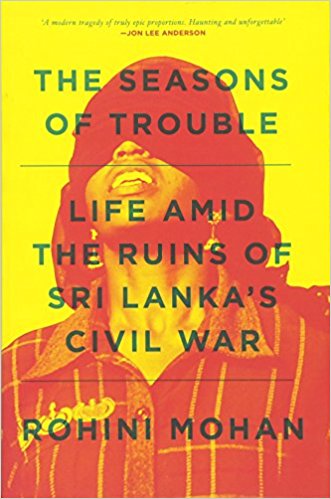“Why do so few educational institutions make use of authentically independent journalists who really risk their lives daily to provide us with details which are intentionally ignored by the mainstream media outlets?” — Richard Martin Oxman
The Troubles of Northern Ireland lasted — by most accounts — about three decades. Another kind of “Troubles” was spread over approximately the same amount of time, but received virtually no press in the West relative to the English/Irish “war,” but is dealt with in depth beautifully by Rohini Mohan in her The Seasons of Trouble: Life amid the ruins of Sri Lanka’s civil war.
 About four years ago, Lucy Popescu, a dear independent journalist friend, penned a great description of the wonderful work, and here I plagiarize, for the most part, her take, adding what I feel is relevant to today for readers. As an educator I am incessantly trying to connect teachers with independent journalists such as Lucy and Rohini to no avail. But the attempt must continue.
About four years ago, Lucy Popescu, a dear independent journalist friend, penned a great description of the wonderful work, and here I plagiarize, for the most part, her take, adding what I feel is relevant to today for readers. As an educator I am incessantly trying to connect teachers with independent journalists such as Lucy and Rohini to no avail. But the attempt must continue.
In May 2010, after almost three decades of conflict with the Liberation Tigers of Tamil Eelam, the Sri Lankan government declared victory. But peace came at a high cost to the Tamil minority. Rohini Mohan, a Bangalore- based journalist, spent five years recording the experiences of three Tamils scarred by this brutal conflict.
In 2008, Sarva, a nautical engineer, was picked up by anti-terrorist police in one of their notorious white vans. He was badly tortured and imprisoned without due process. When he was eventually acquitted, the police claimed not to have received the paperwork. Sarva fled and spent the next two years in safe houses unable to visit his family and friends. Eventually, he decided exile was the only option.
Sarva’s mother, Mohan says, never gave up trying to protect her son. After his “disappearance”, she spent weeks trying to discover where he was held, employed a lawyer and subsequently visited her son every day in detention. Years earlier, she had risked her life and sanity to rescue him from the Tigers’ grip. There were, of course, atrocities on both sides, and one of the strengths of Mohan’s book is its exploration of the grey areas. Sarva’s training with the Tigers is “not easily compartmental- ised as voluntary or forced”. Despite never having engaged in combat, he was illegally detained and tortured, and his family was persecuted.
The third protagonist in this engaging account is Mugil, a committed Tiger who signed up when she was just thirteen. Towards the end of the war, injured and alone, Mugil decides to return to her family and two young sons. She witnesses the shelling of civilians and hospitals and other atrocities in the final months that left up to 40,000 civilians dead. After surrendering, Mugil and her family were detained in Manik Farm refugee camp. The insanitary conditions resulted in her father’s death. As former combatants, Mugil’s brother and husband were held in a “rehabilitation centre”, enduring torture and interrogation. On their release they were unable to get decent jobs and became increasingly alienated. Once reunited, they could only watch as the military appropriated their land and built hotels.
In large part a chronicle of war and its aftermath, Mohan’s impressive study is also a Kafkaesque story of survival in a society riven by ethnic tensions and mutual distrust. And readers should take note that the “disappearance” of “tensions” has been only skin deep, according to some of my other independent journalist sources. They predict privately that in the North of Sri Lanka, where the living conditions of Tamils and mental trauma have shifted only slightly, climate change factors may very well exacerbate tensions to the point where something on the order of what happened in Afghanistan the other day may yet shock the world again in that realm.
The peace in place at present should encourage readers to visit the lovely offerings of Sri Lanka, enjoy its incomparable beauty. But troubles can rear their ugly head overnight in the region, contingent upon what transpires courtesy of our collective climate crisis.
Overnight. Just like the Troubles of Northern Ireland may be “renewed” if the right thing isn’t done during Brexit negotiations vis-a-vis the Customs Union. That border between Northern Ireland and the Republic of Ireland is not being discussed in intelligent fashion at the moment. Not in any realistic way whatsoever.
You could say the same about how world leaders are addressing our climate crisis.
Troubles ahead?
Valleria Ruselli is a member of the Oxman Collective. She can be reached at [email protected]. She is currently conducting a letter writing campaign respecting the “tensions” brewing in both realms touched upon above. The reader is invited to be a part of that… and more.










































